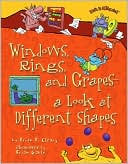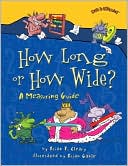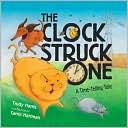I've had these three books hanging around for some time now... all three are math-related, so I figured what better way to share them than having a "Mathematical Monday" post?!
 Cleary, Brian P.
Cleary, Brian P.Windows, Rings and Grapes - a Look at Different Shapes.
September 2009.
Lerner Publishing Company.
Summary from Barnes & Noble:
In this humorous look at shapes, Brian P. Cleary and Brian Gable introduce circles, ovals, triangles, squares, and rectangles. The comical cats of the wildly popular Words Are CATegorical® series explain how to identify each shape and provide loads of examples. Peppy rhymes, goofy illustrations, and kid-friendly examples make shaping up a snap!
This book definitely is a great one to use when teaching shapes, so I would say it would be appropriate for ages 4-7. Rather than using the book in its entirety, I would break up the different shapes taught over the course of several days, or they will become too complex for children to remember. The different shapes are taught through rhyming text and concrete objects are used as examples for each shape, allowing ample opportunity to make connections between shapes and everyday objects!
A circle is round,
like the dot on this gown,
like a Hula-hoop, pie,
or some rings,
the door on this dryer,
a bicycle tire.
The circle forms
all of these things.
There's not one straight line
in a circle's design.
It's just a continuous bend.
It's looped and it's curved,
and when closely observed,
you'll find no beginning or end.
If two dogs would fetch one
and lengthen
and stretch one,
an oval would be its new shape.
- Trace and Color Circles
- Find and Color Circles worksheet
- Trace and Color the Ovals
- Find and Color Ovals worksheet
- Trace and Color Triangles
- Find and Color Triangles worksheet
- Trace and Color Squares
- Find and Color Squares worksheet
- Trace and Color Rectangles
- Find and Color Rectangles worksheet
 Cleary, Brian P.
Cleary, Brian P.How Long or How Wide? A Measuring Guide.
September 2009
Lerner Publishing Company.
Summary from Barnes & Noble:
Brian Cleary and Brian Gable bring their trademark sense of humor to the subject of measuring length. A rhyming text filled with funny examples explains how to use and compare metric and U.S. customary units of length. Readers are also introduced to the tools they need to measure length—rulers, metersticks, and more.
This book is appropriate for children a bit older, I'd say probably ages 7-12, as the concept is a bit trickier. Children need to be somewhat familiar with measurement in order to take the most from this book. Definitely a great book to use when introduce different measurements or even to reinforce the topic! I think the book would be most useful if students are given a ruler and allowed the opportunity to measure different objects using given measurements - millimeters, decimeters, centimeters, inches, etc.
Learning Activities:
- Centimeters/Meters Worksheet
- Inches/Feet Worksheet
- Measuring Lines (inches)
- Measuring Lines (centimeters)
- Common Measures Worksheet
- Famous Bridges of the World Measurement Activity
 Harris, Trudy.
Harris, Trudy.The Clock Struck One: A Time-Telling Tale.
September 2009.
Lerner Publishing Company.
Summary from Barnes & Noble:
When the clock strikes one, a fun-loving mouse runs up the clock. But what happens when the clock strikes two? A cat gets hungry for mouse-tail stew . . . and the chase is on! Hour by hour, more animals - and even a few people - join in. The crowd charges into the barnyard, dashes through the kitchen, and eventually heads right into the middle of town. Keep your eye on the many clocks in this book and follow along until this twelve-hour race comes to a surprising end!
This book would be perfect to use to reinforce time telling practice! The familiar nursery-rhyme on page one will have students chuckling, but the rhymes only get funnier as the story goes on!
Hickory dickory dock,
a mouse ran up the clock.
The clock struck ONE.
He said, "What fun!"
(But the mouse was in for a shock.)
Hickory dicory doo, the grandfather clock struck two.
It woke the cat, who sprang from his mat,
hungry for mouse-tail stew.
Hickory dickory dore,
the dashed across the floor,
splattering food (how terribly rude)
as the cuckoo cuckooed four.
Learning Activities:
If you're interested in finding out more information about any of the books reviewed or if you'd like to purchase the books, click the cover image for a link to Amazon.com.








0 comments:
Post a Comment